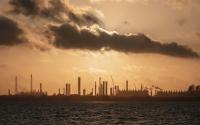30 January 2006
British Prime Minister Tony Blair warned on Monday that climate change may be affecting the planet more dramatically than previously thought."It is now plain that the emission of greenhouse gases, associated with industrialization and economic growth from a world population that has increased six-fold in 200 years, is causing global warming at a rate that is unsustainable," Blair wrote in the foreward to a new report.The report, which collates work that was presented at a conference of the British Meteorological Office in February 2005, is particularly worrying because it indicates that previous reports have underestimated the harmful affects of global warming."It is clear from the work presented that the risks of climate change may well be greater than we thought," Blair wrote in the foreword to the report, "Avoiding Dangerous Climate Change."The European Union had set itself a target of not allowing global temperatures to increase by more than 2 degrees Celsius. However, according to these British scientists, even an increase of 2 percent could have a disastrous impact. The consequences could include lower crop yields in industrial and developing countries, increased desertification, with an accompanying wave of migration in North Africa. Other possible consequences could be water scarcity effecting up to 2.8 billion people, the loss of 97 percent of coral reefs, the extinction of polar bears and walruses due to the disappearance of the ice shelf in the Arctic, and the spread of malaria in Africa and North America. The researchers warn that an increase of just two degrees Celsius could even lead to the melting of Greenland's ice sheets.The last big climate report by the United Nations's Intergovernmental Panel on Climate Change (IPCC) in 2001 predicted that the Antarctic ice would remain stable. But Professor Chris Rapey, head of the British Antarctic Survey, told the Independent newspaper that the situation has changed. "The last IPCC report characterized Antarctica as a slumbering giant in terms of climate change," he said. "I would say it is now an awakened giant. There is real concern." The huge Western Antarctic Ice Sheet may be starting to disintegrate already. And if the land-based ice sheets of Greenland also melt, then the sea level could rise by seven meters (30 feet) within the next thousand years. Acute danger for marine food chainAnother area that the British scientists fear could take a turn for the worse is the acidification of the world's oceans. There has been a spat of reports that indicate that increased levels of carbon dioxide in the sea water are endangering the lives of many marine animals. The process of acidification can destroy the tiniest marine micro-organisms or damage their development. The fact that these changes affect the food chain at its lowest level means that they could spread up the chain, and in the end will presumably affect fish that people eat. Some organisms like coral are already suffering greatly from the altered pH value in the oceans.
The report says that compared with the 2001 IPCC study, "there is greater clarity and reduced uncertainty about the impacts of climate change ... In many cases the risks are more serious than previously thought." It adds that "A number of critical temperature levels and rates of change relative to pre-industrial times were noted. These vary across the globe, specific regions and sensitive ecosystems. For example a regional increase above present levels of 2.7 degrees Celsius may be a threshold that triggers the melting of the Greenland ice-cap, while an increase in global temperatures of about 1 degree Celsius is likely to lead to extensive coral bleaching."Also, a further temperature increase would make a disruption of the northern part of the Gulf Stream, which tempers the climate in northern Europe. Another study showed that the Gulf Stream has already been significantly weakened. British Environment Secretary Margaret Beckett told the BBC that the report was sure to shock many. "The thing that is perhaps not so familiar to members of the public is this notion that we could come to a tipping point where change could be irreversible," she said.
http://service.spiegel.de/cache/international/0,1518,398185,00.html






